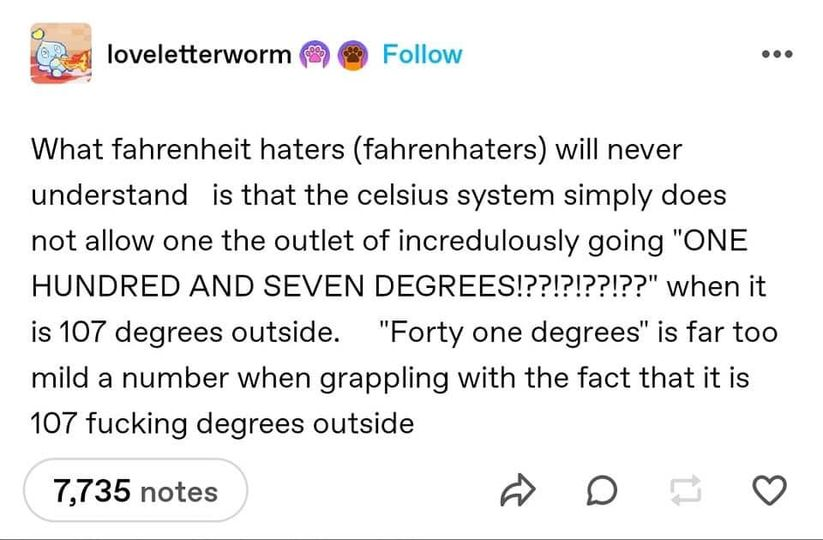this post was submitted on 09 Sep 2024
1237 points (92.3% liked)
Science Memes
14976 readers
864 users here now
Welcome to c/science_memes @ Mander.xyz!
A place for majestic STEMLORD peacocking, as well as memes about the realities of working in a lab.

Rules
- Don't throw mud. Behave like an intellectual and remember the human.
- Keep it rooted (on topic).
- No spam.
- Infographics welcome, get schooled.
This is a science community. We use the Dawkins definition of meme.
Research Committee
Other Mander Communities
Science and Research
Biology and Life Sciences
- !abiogenesis@mander.xyz
- !animal-behavior@mander.xyz
- !anthropology@mander.xyz
- !arachnology@mander.xyz
- !balconygardening@slrpnk.net
- !biodiversity@mander.xyz
- !biology@mander.xyz
- !biophysics@mander.xyz
- !botany@mander.xyz
- !ecology@mander.xyz
- !entomology@mander.xyz
- !fermentation@mander.xyz
- !herpetology@mander.xyz
- !houseplants@mander.xyz
- !medicine@mander.xyz
- !microscopy@mander.xyz
- !mycology@mander.xyz
- !nudibranchs@mander.xyz
- !nutrition@mander.xyz
- !palaeoecology@mander.xyz
- !palaeontology@mander.xyz
- !photosynthesis@mander.xyz
- !plantid@mander.xyz
- !plants@mander.xyz
- !reptiles and amphibians@mander.xyz
Physical Sciences
- !astronomy@mander.xyz
- !chemistry@mander.xyz
- !earthscience@mander.xyz
- !geography@mander.xyz
- !geospatial@mander.xyz
- !nuclear@mander.xyz
- !physics@mander.xyz
- !quantum-computing@mander.xyz
- !spectroscopy@mander.xyz
Humanities and Social Sciences
Practical and Applied Sciences
- !exercise-and sports-science@mander.xyz
- !gardening@mander.xyz
- !self sufficiency@mander.xyz
- !soilscience@slrpnk.net
- !terrariums@mander.xyz
- !timelapse@mander.xyz
Memes
Miscellaneous
founded 2 years ago
MODERATORS
you are viewing a single comment's thread
view the rest of the comments
view the rest of the comments

That was a long way of saying what I said, you just don't see faranheit as ludicrously out of date, while I (and most of the world) do. Live your life as you wish friend. It's a random brine mixture. Maybe it was less random back then, but now it's an arbitrary mixture of water and salts in arbitrary ratios. Deal with it. Fahrenheit sucks.
Every measurement system has had its formal definition changed several times. The kilogram, for example, was once formally defined as the mass of a specific block of metal in France, which was later determined to be losing mass, and thus made a pretty terrible standard. Now, the kilogram is formally defined in terms of the meter and the Planck Constant.
Celsius was once defined by the freezing and boiling points of water, but those aren't actually constant: Fahrenheit's brine mixture is actually significantly more consistent. Kelvin's degree spacing comes from that definition of Celsius, but it it was eventually redefined to be more precise by using the triple point of water: pure water at a specific pressure and temperature where it can simultaneously exist as solid, liquid, and gas. Significantly more accurate, but not enough: Kelvin was redefined in 2019 in terms of joules, which are in turn defined by kg, m, s, which are ultimately defined in terms of the Planck constant.
Celsius is now formally defined in terms of Kelvin. Fahrenheit is also formally defined in terms of Kelvin. Fahrenheit's brine story is just a piece of trivia.